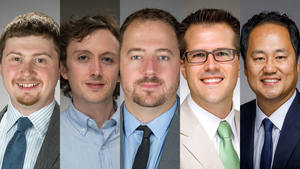
Five engineering faculty members received National Science Foundation (NSF) Early Career Development (CAREER) awards in 2020, bringing the total CAREER award winners in the College of Engineering to 31 over the last five years.
The NSF CAREER award is one of the highest honors given by the U.S. government to young faculty members in engineering and science. Awards are given to faculty with “the potential to serve as academic role models in research and education and to lead advances in the mission of their department or organization.”
The 2020 CAREER award recipients in engineering are:
• Alexander W. Dowling, chemical and biomolecular engineering
• Walter J. Scheirer, computer science and engineering
• Matthew J. Webber, chemical and biomolecular engineering
• Patrick M. Wensing, aerospace and mechanical engineering
• Sangpil Yoon, aerospace and mechanical engineering
“These five faculty members are outstanding leaders in research, innovative teachers, and dedicated colleagues,” said Thomas E. Fuja, interim dean. “To have five CAREER recipients in one year — and more than 30 in five years — is a testament to the trajectory of the college and a sign of continued growth as a force for good.”
Dowling specializes in environmentally focused and sustainable energy applications. His CAREER project, “Uncertainty Quantification and Optimization with Hybrid Models for Molecular-to-Systems Engineering,” aims to develop a modeling strategy to address uncertainties in the design and analysis of complex systems across molecular to infrastructure scales.
Scheirer focuses on computer vision, machine learning, biometrics, and digital humanities. His CAREER project, titled “Learning at the Edge: An Extreme Value Theory for Visual Recognition,” will generate new biologically-inspired models of visual recognition for artificial intelligence. These models could have an impact on industry applications, such as self-driving cars and assistive technologies, as well as in basic science areas, such as vision science, psychology, and neuroscience.
Webber explores supramolecular biomaterials, “smart” drug delivery and diagnostics, bio-inspired materials, and supramolecular chemistry to address pressing problems in healthcare. The goal of his CAREER project, “Dissipative non-equilibrium supramolecular hydrogels using fuels,” is to create a new class of materials inspired by nature, which activate in response to specific cues but exist only for a short time.
Wensing studies human-machine interface technologies, such as for assistive exoskeletons in rehabilitation applications. His CAREER project, titled “Task-Level Coordination of Motor and Machine for Fluent Lower-Limb Prostheses,” examines the role of whole-body balance in the development of a new paradigm for powered prostheses to improve comfort, increase mobility, and reduce falls for people with lower-limb amputations.
Yoon develops diagnostic and therapeutic devices for cell engineering in cancer treatment, including personalized immunotherapies such as adoptive cell transfer. His CAREER project, titled “The Next Generation Intracellular Delivery Device for Immunotherapy: The Integration between Ultrasonic Transducer and Microfluidic Chip (UXuChip),” targets the development of a safer and more efficient intracellular delivery device to reinfuse a patient’s T cells once they have been reengineered.
Originally published by Nina Welding at engineering.nd.edu on June 30, 2020.
